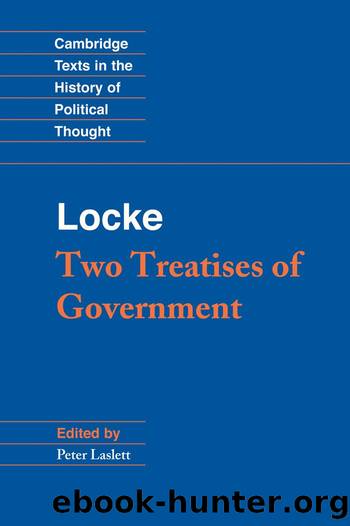Locke: Two Treatises of Government (Cambridge Texts in the History of Political Thought) by John Locke

Author:John Locke [Locke, John]
Language: eng
Format: epub
Publisher: Cambridge University Press
Published: 1988-10-28T06:00:00+00:00
* * *
§ 1 8 âthe Encomium of Nero*, Encomium Neronis by Jerome Cardan, 1546. Locke owned Cardanâs Opera, Leyden, 1663 (H. and L. 587).
9 The title of Filmerâs book was Patriarcha : or the Natural Power of Kings, and was prefixed by an epistle from his friend Peter Heylyn, the Royalist Divine. Van Hoveâs engraved portrait of Charles II was the frontispiece, marking the connection of its publication with the Royal Court. Compare 1, § 14, 5 and 1, § 129, 1, and on Heylyn see Laslett, 1948, 1949: on the publication of Patriarcha, and Lockeâs personal copy, see Introduction, 57 and note.
Locke is disingenuous in implying that this was his first encounter with Filmerâs works, see Introduction, 34.
§ 2 8 Patriarcba was written c. 1637â8, not published till 1680: see Introduction, 57, and Laslett, 1949.
11 âPattern in the Mountâ, Heb. viii. 5, itself a reference to Godâs Commandments on Sinai.
12-16 Filmerâs system, summarized by him on p. 229 of Laslettâs edition.
§ 4 14 For these authors see Patriarcha (Laslett, 1949), p. 54, and compare 1, § 67, 28-30. Barclay is quoted in 11, §§ 232, 6; 235-9: Locke listed in 1681 Barclayâs De Potestate Papae and his De Regno et Regali Potestateâsee notes on 11, §§ 232, 239.
§ 5 1 Paragraph number omitted in 1st edition, both states.
4 Refers to the famous sermons exalting the Royal Prerogative preached and published in 1627 by Robert Sybthorpe (Of Apostolique Obedience) and Roger Manwaring (Religion and Allegiance), see Allen, 1938, 176-80. They are also named by Sidney in somewhat the same way: 1772, 5.
7-8 Compare Preface 39 (added in 1698): Sir Robert Filmerâs brother Edward was at the Court of Charles I and a francophile, a friend of Henrietta Mariaâs, and his son Edward was Gentleman of the Privy Chamber to Charles I and Charles II (see Laslett, 1948 (ii)), but he himself was never a courtier. In this sentence âwasâ seems to have been changed from âisâ in 1689.
* In Grants and Gifts that have their Original from God or Nature, as the Power of the Father bath, no inferior Power of Man can limit, nor make any Law of Prescription against them, O. 158 [233].
The Scripture teaches, that supreme Power was Originally in the Father without any Limitation, O. 245 [234].
§ 6 4 Caput inter nubilaâhead in the clouds.
6 Compare II, § 195, 5-7.
8-10 I Peter ii. 13, âsubmit yourselves to every ordinance of menâ (νθÏÏÏνκÏÏâι). Compare the second Letter on Toleration (Works, 1801, VI, 121).
11-23 Implying that Locke had dealt with the Other Treatisesâ when he decided to analyse Patriarcha, see above, p. 59, note â and references.
29 Bellarmine. Filmer directed much of his argument against Cardinal Bellarmineâs subordinating secular power to the papacy in his De Vatéstate Summi Pontifici, 1610âsee Laslett, 1949; Mcllwain, 1918.
43-4 Not a quotation, but a summary of Patriarcha, 57-8.
48 âfirst Chapterâ, i.e. paragraphs i-viii of Patriarcha in Laslettâs edition, where there are no chapters since it reproduces Filmerâs manuscript which lacks them.
51 âin another placeâ; see 1, § 11, 31 note and references.
Download
This site does not store any files on its server. We only index and link to content provided by other sites. Please contact the content providers to delete copyright contents if any and email us, we'll remove relevant links or contents immediately.
The remains of the day by Kazuo Ishiguro(7585)
Tools of Titans by Timothy Ferriss(6980)
The Black Swan by Nassim Nicholas Taleb(6217)
Inner Engineering: A Yogi's Guide to Joy by Sadhguru(5920)
Giovanni's Room by James Baldwin(5901)
The Way of Zen by Alan W. Watts(5814)
The Six Wives Of Henry VIII (WOMEN IN HISTORY) by Fraser Antonia(4803)
The Power of Now: A Guide to Spiritual Enlightenment by Eckhart Tolle(4780)
Astrophysics for People in a Hurry by Neil DeGrasse Tyson(4634)
Asking the Right Questions: A Guide to Critical Thinking by M. Neil Browne & Stuart M. Keeley(4609)
12 Rules for Life by Jordan B. Peterson(3760)
The Ethical Slut by Janet W. Hardy(3521)
Skin in the Game by Nassim Nicholas Taleb(3489)
Housekeeping by Marilynne Robinson(3427)
The Art of Happiness by The Dalai Lama(3397)
Double Down (Diary of a Wimpy Kid Book 11) by Jeff Kinney(3292)
Skin in the Game: Hidden Asymmetries in Daily Life by Nassim Nicholas Taleb(3280)
Walking by Henry David Thoreau(3242)
12 Rules for Life: An Antidote to Chaos by Jordan B. Peterson(3211)
